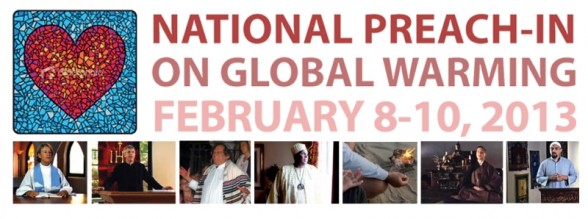National Preach-In on Global Warming

By Muaz Nasir
The issue of climate change has become more prominent in recent years. Large storms have wreaked havoc across many urban centres this past summer and a series of droughts throughout the prairies have resulted in spikes in global grain prices. At home, Environment Canada is in the process of re-evaluating its benchmark calculations for precipitation and temperature patterns to reflect the changing climate. These predictive figures are used in building infrastructure to forecasting the mosquito season and the projections paint a grim and costly future. In the absence of proactive policy from the federal government, faith groups have stepped up to voice their concerns.
The National Preach-In on Global Warming (February 8-10, 2013) is an interfaith campaign that focuses on how climate disruption is affecting different communities worldwide. It calls on religious leaders in the United States to raise the issue in their congregations through their sermons, by facilitating discussions on climate change and engaging their youth on the importance of taking action from a moral and spiritual perspective.
Global warming is one of the biggest threats facing humanity today. The very existence of life — life that religious people are called to protect — is jeopardized by our continued dependency on fossil fuels for energy. Every major religion has a mandate to care for Creation. We were given natural resources to sustain us, but we were also given the responsibility to act as good stewards and preserve life for future generations. (Interfaith Power and Light)
The campaign provides resources for congregations that are interested and includes faith statements from the Islamic perspective. As stewards of the earth, Muslims have a responsibility to respect the earth and to ensure a livelihood for future generations. There are multiple references in the Quran that condone tampering with the balance of nature (Quran 55:8) and causing mischief upon the earth (Quran 28:77). Disrupting the carbon balance by clearing forests faster than they can regenerate and our increasing reliance on fossil fuels as a primary energy source are two examples of how we are contributing to global warming.
While it may seem like a daunting task, there are small actions we can take to reduce our individual impacts on the environment. The David Suzuki Foundation provides tips for reducing your carbon footprint under four broad categories.
Transportation:
- The next time you are looking to purchase a new vehicle, consider fuel-efficient options that are low in emissions. The prices for electric and hybrid vehicles have come down over the last few years and there are government incentives offered on certain models.
- Consider alternative forms of transit during your daily commute; such was biking, walking or public transit. Some employers are now offering to cover environmentally friendly modes of transit for their employees.
- Learn about the environmental impacts of air travel and use it sparingly if possible for vacation or leisure. This summer consider exploring the sights closer to home, or travel by coach or rail.
Energy:
- If you have older appliances or electronics at home, consider switching to more energy efficient models. The power consumption on older models can be as much as double compared to newer ones and many contain ozone-depleting chemicals that are no longer used.
- Perform an energy audit at home to identify possible heat loss during the winter. Seal any cracks or leaks around windows and doors and increase the insulation in your attic. Also, take an inventory of electronics in your home and minimize the amount of vampire power that is wasted.
Food:
- Choose products that are locally made and opt for seasonal produce where possible. The food on our plate may travel thousands of miles, contributing towards global warming.
- Avoid wasting food. At least a third of the food that is produced is wasted through transport, spoilage or thrown away by the consumer. The carbon invested in growing, harvesting, producing and transporting these foods are wasted when food is thrown away.
Be Proactive:
- Join The National Preach-In on Global Warming and urge your Imam/religious leaders to bring attention of climate change issues to your congregations.
- Raise the issue of climate change and global warming with your elected representatives. Canada has pulled out of its Kyoto commitments because we as citizens have not made it priority for our politicians.
- Lead by example! Encourage others in your social circle to adopt carbon neutral practices and educate them on possible alternatives.
Like many of the environmental issues that face us today, collective action plays a key role in alleviating the problem. Becoming more aware and educating others goes a long way in changing carbon-intensive behaviours that could adversely affects us as a society in the future. Irregardless of the faith, we all have a collective role to play in ensuring a safe and healthy planet for future generations.
Allah, in His Wisdom, appointed humans… to be His vice regents on earth. And while Allah has invited people to partake of the fruits of the earth for their rightful nourishment and enjoyment, He has also directed them not to waste that which Allah has provided for him—for He loveth not wasters. (Muslim World League).
[Source: Khaleafa.com]

